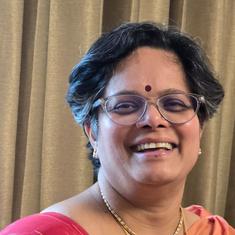It is the M word – menstruation.
Menstruation has become a subject of open debate largely thanks to 20-year-old Nikita Azad. Earlier this month. Prayar Gopalakrishnan, president of the Travancore Devaswom Board that manages the Sabrimala Ayyappa Temple in Kerala, had justified keeping menstruating women out of the shrine. Azad reacted by starting a counter campaign, urging young women to hold placards or sanitary napkins reading "Happy To Bleed". She started a Facebook event for this purpose and a related hashtag on Twitter.
The campaign is novel because we never discuss menstruation so openly. It’s often spoken about in private – between women, between mothers and daughters, between sisters – but never in public.
We grow up not saying “to menstruate” or “I’m menstruating”. Instead, girls will say they have their “chum” (a strange term). At most, they might say “period”. The old-fashioned will say “menses”. In Marathi, you will indirectly say it is that time of the month.
But that time of the month is not a time for celebration. You don’t jump with joy when you start to bleed. Far from it.
Difficult experience
What I’m about to narrate is probably a familiar story. When I began menstruating, I was horrified. I didn’t know what was happening to my body. I was irritated, angry and depressed on being told that this was not a one-off, a medical condition that would be “cured”. It was a permanent condition that would affect me every month, or rather every 28 days.
“Not fair”, I told my father, who had more patience to discuss these matters than my mother, who thought I was an argumentative brat. “I wish I was a boy,” I wailed. “At least then I wouldn’t have to suffer this nonsense for the rest of my life”.
My understanding father countered: “But boys also have problems. They have to shave every single day.”
“Yes, but they can grow a beard to avoid shaving. I have no such option,” I said with a sense of defeat. My father had no comeback and decided to leave the matter there.
So menstruation is not a happy occurrence for girls. It is frustrating, inconvenient and happens far too often. Sometimes there are cramps before it comes. Often there is pain when it comes. And it’s messy. It hampers your movement, changes your walk, and makes you self-conscious. Don’t tell us that the latest sanitary napkins or tampons have altered this reality. It has only allowed us to manage the situation better
But Nikita Azad and her supporters are absolutely right in asserting that what happens to their bodies is not dirty and impure. It is a fact of life. And they are not apologetic.
There is little comfort in knowing that it is not just Hindu temples, but other religions also place restrictions on menstruating women. Why? And what logic justifies this sustaining tradition? This is what is being asked today.
It’s truly bizarre that the Sabrimala priest should suggest that a machine be invented to check whether a woman is bleeding before she can enter a temple. A man of religious dogma is turning to science to enforce illogical tradition: it must be a first.
Positive movement
#HappyToBleed may disappear after a few weeks, but it’s what the hashtag represents that we need to understand.
Feminists have campaigned through the ages for the rights of women over their bodies. This meant fighting for the right to abortion, the right to use contraceptives, the right to healthcare that extended beyond the reproductive organs, and the right to feel comfortable in our skins. Feminist campaigns have been anchored in the belief that just because men and women are biologically different, women cannot be treated as lesser beings where the difference is used to whip them into submission and into accepting secondary status.
What is notable about many of the recent campaigns by young women is their ability to turn this basic belief into one that projects their own confidence and comfort with who and what they are. In many ways, launching a campaign like #HappyToBleed and posting pictures of themselves holding up sanitary napkins containing the hashtag demonstrates that today’s feminists are as confident and creative as women in the past. They have the added advantage of new technologies and new platforms that allow for different forms of campaigning, which they use to their benefit.
What is also noteworthy is that they see these campaigns not as a gimmick but as a way to challenge what lies beneath – the P word, or Patriarchy. Nikita Azad was at pains to explain that her campaign was not about temple entry for women but "a protest against patriarchy and gender discriminatory practices prevalent in our society".
Every such campaign chips away at the structures of patriarchy that remain in place in India. The structure is in no danger of crumbling just yet. But if enough young women learn to question and challenge regressive attitudes, perhaps there is hope.










